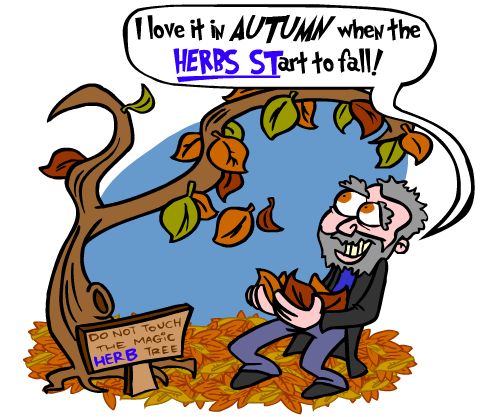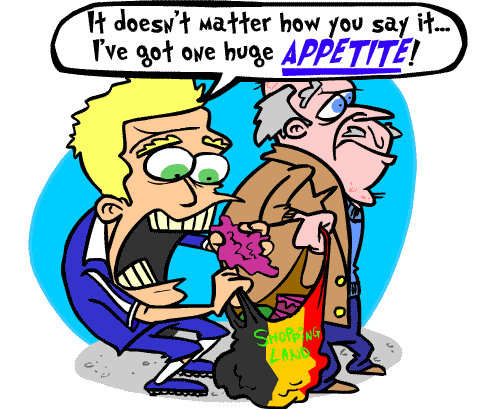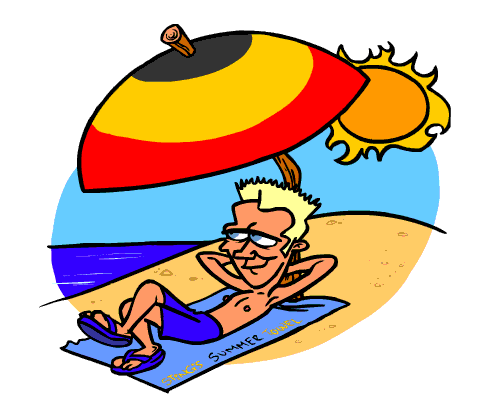|
Learn German BLOGThis Learn German BLOG** takes regular little snippets, tips and quips, of useful and interesting German learning bits and pieces. I post stuff on the site whenever and wherever things pop up.... Things that will be of interest to learners of German language and culture. If you have any tidbits to contribute do contact us via the Learn German Blog contact us form below. der Herbst (nm) = autumn, fallImagine that in autumn the jazz musician HERB Alpert (m) likes to watch the HERBS STart to fall.
der Appetit (nm) = appetiteImagine the huge APPETITE of Emmanuel PETIT (m), eating from a bag in the German colours - yellow, red and black.
Man ist was man isst. = You are what you eat.
der Sommer (m) = summerImagine spending SUMMER under an umbrella in the German colours - yellow, red and black - on the beach is Gordon Sumner (m).Remember the picture, remember the word - male character indicates this noun is masculine. The German colours help you remember this word is very similiar to the English word. You scratch my back, I'll scratch yours...."Nennst du mich Goethe, nenn ich dich Schiller!""You call me Goethe, and I'll call you Schiller" ... is a German saying meaning - you pay me a compliment and I will do the same. Schiller was a German poet, historian, philosopher who was friends with writer and man of letters Goethe. They collaborated on various works in the late 1700's to early 1800's. Feminine GenderNouns with Feminine Gender generally follow several patterns, as outlined here, though it is always best to learn the gender of nouns at the same time as the word itself. Click to read Feminine Gender. Masculine GenderA useful list that helps identify groups of nouns with masculine gender. Of course there are always exceptions. The 200 Words a Day! language learning system helps to further reinforce the gender of a noun at the same time as learning the word. Click to read Masculine Gender. Who named the Mercedes?Did you know the Mercedes brand was named after someone's daughter? Practise your German now by reading about the world famous Mercedes car. A short German lesson with text written by a native German, is followed by its English translation, and a vocabulary list. Click to read Mercedes - die Marke. Saying you in GermanSieIn German, Sie is the formal way of saying you, both singular and plural, to a person (or persons) who is a stranger, superior, elder, casual acquaintance or a business associate. These are formal, business relationships. It is used to show respect, and also non-physical distance from another person. Sie (you, formal) is always written in capital letters. Note: The German pronoun sie without capitals = they. Du / IhrDu is the singular you form used when addressing family, children and young people, friends, colleagues and animals. These are personal relationships.Ihr is the plural you form used when addressing family, children and young people, friends, colleagues and animals. Du / Ihr are always written with a capital in letters. Note: The German possessive pronoun ihr without capitals = her, its, their. Du is used when addressing God. You should wait for the other person to invite you to use Du with them, as a sign of a transition to a more personal kind of relationship, when they feel it is appropriate. This is called duzen – lit. to become Du – to communicate with more familiarity. Using Du to address someone older or less-known without their permission, is deemed rude and inappropriate. These days young German people do tend to be less formal and use Du terms on first meeting with strangers of a similar age. Proverb:Eine Schwalbe macht noch keinen Sommer! One swallow doesn't make a summer! The swallow migrates north from Africa, so its appearance is considered to herald the beginning of summer in Europe. Just because one swallow appears however, does not necessarily mean the summer season has arrived. The proverb is taken from an Aesop fable "The Spendthrift and the Swallow", which tells the story of a spendthrift young man who has wasted away his fortune. When he sees the first swallow, he sells the coat off his back thinking he wouldn't need it as summer had arrived. A cold snap follows, and he is freezing cold. When he finds the swallow frozen to death, he blames it for arriving too early and for his own demise. Moral: Show a little patience, don't rush ahead into things. / A sign is not necessarily proof - do not rejoice too soon. die Schwalbe = swallow (bird) And also: "eine Schwalbe machen" (slang) = lit. "to make like a swallow" - to take a dive, to fall on purpose, eg. a footballer diving to gain a free kick! Wie ist das Wetter? = What is the weather like?PRESENT TENSE PAST TENSE FUTURE TENSE Das Wetter ist herrlich! = The weather is glorious! Das Wetter ist schön. = The weather is nice. Es ist besser als Zuhause. = It is better than at home. Das Wetter ist wechselhaft. = The weather is changeable. Das Wetter ist kühl. = The weather is cool. Das Wetter ist schlecht. = The weather is bad. Saying sorry in GermanEntschuldigen Sie (bitte)! = Excuse me (please)! Sorry! Oh sorry! I'm so sorry!Pardon/I beg your pardon! (sich) entschuldigen (v) = to say sorry; to excuse (oneself); to pardon. sich entschuldigen lassen = to send one’s apologies die Entschuldigung (f) = excuse, apology. Ich bitte um Entschuldigung. = I do apologise. entschuldigend (adj/adv) = apologetic / apologetically. Also: Verzeihung! = Sorry!, I’m sorry! Es tut mir leid. = I’m sorry. Es tut mir leid dass ... = I’m sorry that … Es tut mir leid wenn ... = I’m sorry if … Es tut mir leid aber ... = I’m sorry but … Das tut mir alles schrecklich leid.= I’m so sorry for everything. Es tat mir leid. = I was sorry. Es tat uns leid das zu hören. = We were sorry to hear that. Getting to know someone - some simple questions to ask:When asking people your own age or younger, family in an informal situation, use the informal/familiar Du for you: Wie heisst Du? = What's your name? Ich heiße Cornelia. = My name is Cornelia. Woher kommst Du? = Where are you from? Ich komme aus Hannover. = I come from Hannover. Wo wohnst Du? = Where do you live? Ich wohne hier in Stuttgart. = I live here in Stuttgart. Wie alt bist Du? = How old are you? Ich bin zweiundzwanzig Jahre alt. = I am twenty-two years old. Kennst Du meine Freundin? = Do you know my friend (f) / girlfriend? Nein, es freut mich. = No, pleasure to meet you. -------------- When asking someone who is older, in the workplace, or in a formal situation, use the formal Sie for you: Wie heissen Sie? = What's your name? Woher kommen Sie? = Where are you from? Wo wohnen Sie? = Where do you live? Wie alt sind Sie? = How old are you? Kennen Sie meine Freundin? = Do you know my friend (f) / girlfriend? Check out the webpage of learning German verbs. Some handy hints in this overview of the structure of German verbs and verb construction. "Was ist das deutsche Wort für ....?"You will probably be asking this question quite a bit as you build up your German vocabulary .... = "What's the German word for ...?" or Alternatively, you could rephrase this and ask: "Wie sagt man .... auf deutsch?" = "How does one say .... in German?" For example: "Was ist das deutsche Wort für 'hedgehog'?" = "What is the German word for 'hedgehog'?" or Answer: der Igel (m) Das deutsche Wort für 'hedgehog' ist 'der Igel'. = The German word for hedgehog is 'der Igel'. or gernHere's a useful little adverb with a variety of connotations, such as: happily / with pleasure / gladly / readily / willingly Gern! = Of course! Aber gern! = But of course! Ja, gern! = Yes, please! (gladly!) Gern geschehen! = You're welcome! / Don't mention it! / It's my pleasure! etwas gern haben = to like something (etwas) gern essen = to like eating (something) (etwas) gern trinken = to like drinking (something) Ich studiere gern. = I like studying. Ich gehe sehr gern ins Kino. = I love going to the movies. gern mögen = to fancy Ich mag ihn so gern! = I really fancy him! etwas gern tun = to like doing something or to tend to do something etwas gern machen = to like making/doing something etwas gern sehen = to like to see something happen gern wissen wollen = to wonder/ would like to know Ich möchte gern wissen wie alt sie ist. = I wonder how old she is. (I'd like to know how old she is) When are the STAT FINDINGS taking place?STATTFINDEN is a commonly used verb meaning to 'take place' or 'to happen'. Sounds like STAT FINDING, as in finding statistics.Wann soll die Veranstaltung stattfinden? When will the event happen, or take place? German colloquialism for brand spanking new!Here's a good one that my German friend from Cologne used yesterday.nigel nagelneu! = Brand spanking new! Der Nagel is the German word for nail. We and they BITE BISON!One of the good things about the German present tense, is that it has only one simple form.For example I bite, I do bite, and I am biting are all: ich beiße - I bite i.e bite and biting are one and the same... du beißt - you bite (informal, singular) What is a smoking rabbit doing by the Railway TrackWhy is the smoking rabbit by the railway track? He's helping you learn German and remember words and gender the 200 Words a Day! way. He has a pane of GLASS and ICE...Check out the Memory Trigger for 'railway track' in German, and about learning your genders. Also about animals and smoking... Genders are so important in German, not solely for getting the masculine, feminine and neuter articles in the right place, and not calling a he a 'she', or a she an 'it'. The German cases are all based on gender too. Cases are the way the articles (e.g the word the) change depending on what happens during an action. I shall write more on that soon. But the moral of the story is - you must learn your genders to enable you to learn your cases. If you don't, then you will be forever in a tangle. German for JourneyCheck out the little Memory Trigger© for the German word for 'journey'.Here we have Condoleeza RICE to help you remember the word, and remember the gender of it. And we add a bunch of other words that are related to die REISE. Check out the Memory Trigger for 'journey' in German. **blog is short for weblog, and is a short, newsy, info update on a website, like a diary. So it is like a 'what's new' on any topic. Learn German Fast | Foreign Service Institute FSI German Courses for Diplomats (trained thousands of US Diplomats) | Store - Buy it Here | Learn Spanish Blog - regular tips and updates | Learn French Blog | 200 Words a Day! General Language Learning Blog Learn German Blog - regular quips and tips for learners of German language. 200 Words a Day! Excelerated Language Learning Software Transcity Properties Ltd, 32 Alverton, Great Linford, Milton Keynes, Buckinghamshire, MK14 5EF, United Kingdom© 2012 - Learn German Blog. |
IMAGINE how you'd
FEEL
seeing yourself learning at a rate of 200 words a day ... the ideal companion course that complements any language course.
|












